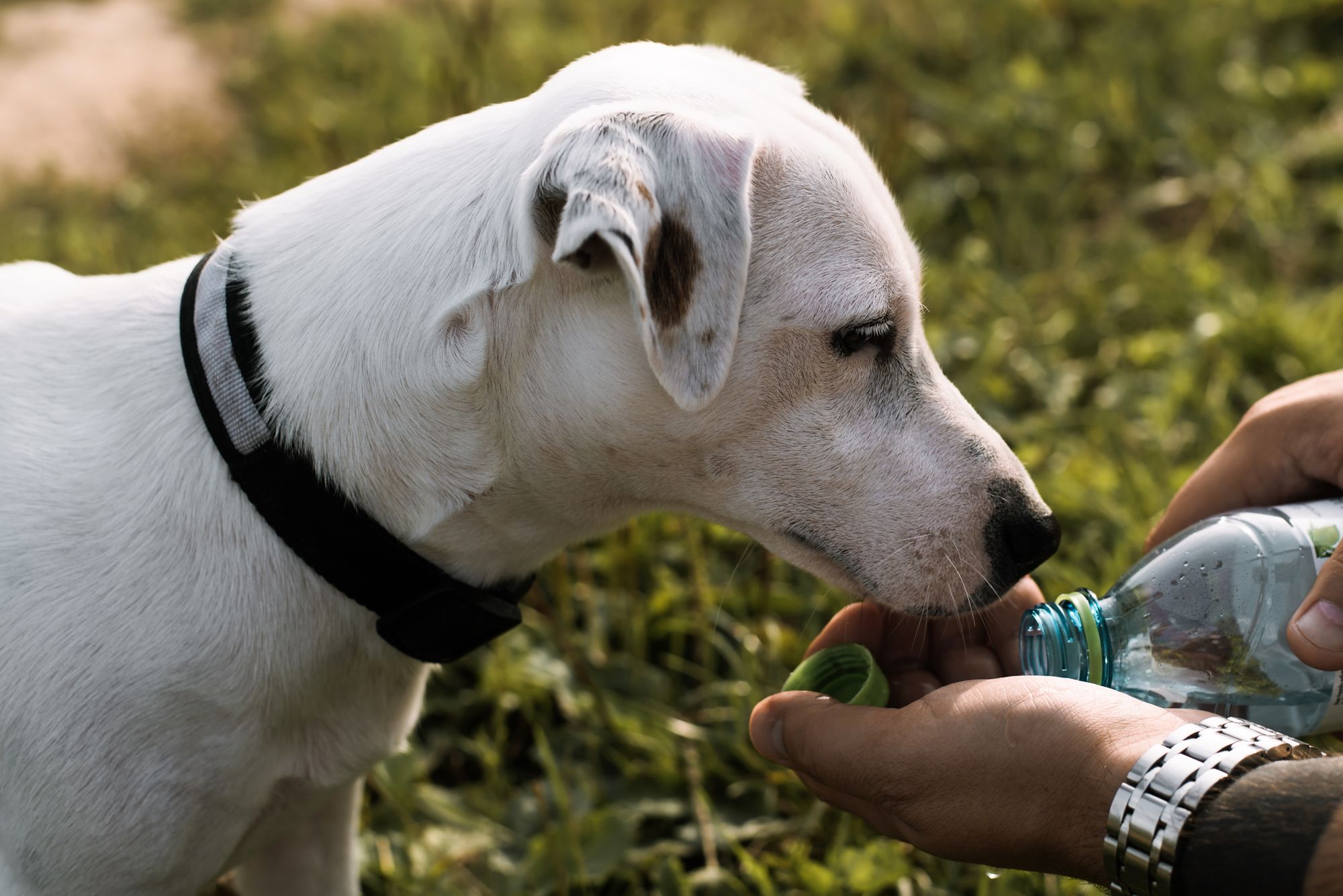How Much Water Should You Drink a Day?
Should you be guzzling water 24/7? Is everyone chronically dehydrated? In this article, find out (exactly) how much water you should drink a day.

Poor performance in the gym? Drink more water. Tired, dull-looking complexion? Time to grab yourself one of those water bottles emblazoned with motivational quotes – “Keep going” and “Don’t stop till you’re finished” – so you remember to drink up ?
Hydration appears to be the solution to everything these days. The purported benefits of water consumption are seemingly endless, from improved lifting performance to better mental health to enhanced cognitive functions.
But ever the skeptic, you can’t help but have your doubts. Must you (and should you) be guzzling water 24/7?
What’s the “minimum effective” dose of water you should be drinking daily? After all, bloated bellies and constant trips to the bathroom are no fun. At all. Don’t worry, that’s what this article is for. Here, we break down exactly how much water you should drink a day.
What is “hydration”?
What do you think of when you hear the term "hydration"? Is it the amount of water you have in the body? If so, then, well, that's where you're a little off-track.
From a medical standpoint, the most crucial measure of hydration is the balance between electrolytes, like sodium and calcium, and water in the body.
To understand the significance of this delicate balance between electrolytes and water, you must first know the former.
Put simply, electrolytes are minerals that carry an electric charge.
These charges are crucial to many bodily functions, including nerve impulse conduction, muscle contraction, and pH level regulation. Take sodium, for instance. It plays a key role in muscle excitation and contraction (i.e., without it, you can't perform those bicep curls or move at all, in fact).
So, imagine what happens when the balance between electrolytes and water is thrown off. Yep, Bad Things.
More specifically, severe electrolyte imbalances are known to cause symptoms like fatigue, fast or irregular heartbeat, numbness, tingling, muscle weakness and cramping, headaches, and even convulsions.
Note that inadequate water consumption isn't the only contributor to electrolyte imbalance (i.e., dehydration). There's also the excessive consumption of water to think about.
And that, in turn, confirms all the suspicions you had about all the well-meaning advice you’ve received to “just drink more water, you’ll feel better!” You can’t just drink all your problems away (applicable to alcohol and water).
If it makes things easier, think of hydration as on a spectrum. There’s a sweet spot to be had – right in the middle.
How much water should you drink a day? (Official recommendations)
But wait. How do you know what this sweet spot is? Well, according to the Institute of Medicine of the National Academies, here’s how much “water” you should be drinking per day:
- Adult women: 2.7 liters (91 ounces or 11 cups)
- Adult men: 3.7 liters (125 ounces or 15 cups)
Notice the quotation marks used with water?
That wasn't simply a spasm of the fingers – but, instead, a conscious decision. That's because this measurement accounts for total daily fluid rather than merely water. Uh-huh: there's a difference between water and fluids.
Examples of fluids you’d typically consume throughout the day include your favorite beverages (e.g., coffee, tea, milk, or even boba!) and “water-rich” fruits and vegetables, like watermelon, cucumbers, and all sorts of berries.
If you're a fervent caffeine lover, your eyes might have caught on to the words "coffee" and "tea". Coffee and tea will dehydrate you, right? Aren't these some of the most dehydrating beverages around?
That’s a misconception. Caffeine can indeed increase blood flow to your kidneys, encouraging them to release more water through urine.
But you're unlikely to drink the amount of caffeine needed to dehydrate you significantly. Studies consistently show that you have to consume more than 500 mg per day (roughly five cups) of brewed coffee for that to happen.
Oh, and here’s an interesting fact: milk could be better than water for hydration.
Take this study, for instance. Researchers found low-fat milk to be the beverage of choice for rehydration after mild exercise-induced dehydration, compared to water or a sports drink, amongst 11 healthy adults. But wait.
How can milk be better than water? The answer lies in its sodium and potassium content; these electrolytes help maintain the proper balance between your bodily fluids and electrolytes.
Um, so does this mean you should hydrate with milk? Definitely not. Think about all the extra calories you'd be consuming. It's just a fun fact.
Your exact water needs can vary
Right. So, 2.7 liters if you’re female, and 3.7 liters if you’re male. That’s how much water you should drink per day … right? There’s no ambiguity to it? Unfortunately, things aren’t that straightforward.
Daily water needs can vary between individuals, depending on their:
- Physical activity level
- Climate
- Sweat rate
- Metabolism (which can, in turn, depend on body size)
- Alcohol consumption
Ultimately, there are many factors at play. Your water needs can differ from your colleagues, friends, and loved ones.
But it can also vary on a day-to-day basis. For example, you may work in an air-conditioned room one day, then perform on-site visits at a client's (extremely hot) worksite the other. As a result, you're going to need more water on the second day.
Psst: and because “how much water should I drink to lose weight” is such a common search term, no, the amount of water you consume doesn’t impact your weight loss results (assuming you’re adequately hydrated).
Losing weight comes down to calorie balance – and we explore this in detail in our past article, “How to Eat and Workout for Healthy, Sustainable Fat Loss”, here.
Determining how much water you should drink a day
All this begs one question: how will you ever know if you’re properly hydrated?
Answer: your pee. Here’s the thing. When you’re dehydrated, the body tries to conserve whatever fluids it has – which means your urine will become more concentrated, increasing its color intensity and pungency.
Dehydrated urine will thus typically be darker in color and have a foul smell. On the flip side, you also don't want completely clear urine. As mentioned earlier, there's a sweet spot to hydration.
Go too far right (i.e., overhydrate), and you run the risk of electrolyte imbalance (and all its associated dangers), too.
So, your “target” urine color and smell? It’s light yellow, with little to no smell. Tweak your fluid intake accordingly.
Takeaway
Hydration is just one part of your fitness journey.
There's also the training bit you can't afford to neglect. So for those searching for an all-in-one fitness app that'll help you plan workout programs (that just make sense), track progress, stay motivated and be accountable to your goals, well, your search ends right here with GymStreak.
References
Armstrong, L. E., & Johnson, E. C. (2018). Water Intake, Water Balance, and the Elusive Daily Water Requirement. Nutrients, 10(12). https://doi.org/10.3390/nu10121928
Bird, E. T., Parker, B. D., Kim, H. S., & Coffield, K. S. (2005). Caffeine ingestion and lower urinary tract symptoms in healthy volunteers. Neurourology and Urodynamics, 24(7), 611–615. https://doi.org/10.1002/nau.20179
Juan Jose Olivero, S. (2016). Cardiac Consequences Of Electrolyte Imbalance. Methodist DeBakey Cardiovascular Journal, 12(2), 125. https://doi.org/10.14797/mdcj-12-2-125
Marx, B., Scuvée, É., Scuvée-Moreau, J., Seutin, V., & Jouret, F. (2016). [Mechanisms of caffeine-induced diuresis]. Medecine Sciences: M/S, 32(5), 485–490. https://doi.org/10.1051/medsci/20163205015
Neuhäuser-Berthold, null, Beine, S., Verwied, S. C., & Lührmann, P. M. (1997). Coffee consumption and total body water homeostasis as measured by fluid balance and bioelectrical impedance analysis. Annals of Nutrition & Metabolism, 41(1), 29–36. https://doi.org/10.1159/000177975
Nutrient Content of Milk Varieties | MilkFacts.info. (n.d.). Retrieved March 14, 2022, from http://www.milkfacts.info/Nutrition Facts/Nutrient Content.htm#Tab4
Report Sets Dietary Intake Levels for Water, Salt, and Potassium To Maintain Health and Reduce Chronic Disease Risk | National Academies. (n.d.). Retrieved March 14, 2022, from https://www.nationalacademies.org/news/2004/02/report-sets-dietary-intake-levels-for-water-salt-and-potassium-to-maintain-health-and-reduce-chronic-disease-risk
Riggs, J. E. (2002). Neurologic manifestations of electrolyte disturbances. Neurologic Clinics, 20(1), 227–239, vii. https://doi.org/10.1016/s0733-8619(03)00060-4
Shirreffs, S. M., Watson, P., & Maughan, R. J. (2007). Milk as an effective post-exercise rehydration drink. The British Journal of Nutrition, 98(1), 173–180. https://doi.org/10.1017/S0007114507695543
Terry, J. (1994). The major electrolytes: Sodium, potassium, and chloride. Journal of Intravenous Nursing: The Official Publication of the Intravenous Nurses Society, 17(5), 240–247.
Tobias, A., Ballard, B. D., & Mohiuddin, S. S. (2022). Physiology, Water Balance. In StatPearls. StatPearls Publishing. http://www.ncbi.nlm.nih.gov/books/NBK541059/

